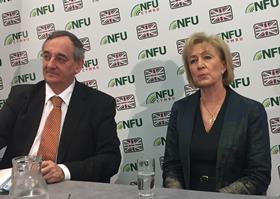
The NFU president has called on Andrea Leadsom to give clear commitments to UK agriculture following months of frustration and uncertainty about the future of the industry as the UK negotiates its exit from the European Union.
In his opening speech at the 2017 NFU Conference in Birmingham, Meurig Raymond criticised the government’s hastily published White Paper for giving unclear commitments on EU market access and trying to wriggle out of firm promises on how it will support the industry.
In particular, Raymond questioned what was meant by the government’s statement that ‘continued high levels of market access are in the UK and EU’s mutual interest’. “What does that actually mean for farmers?” he asked.
The key message from the NFU president’s speech was that giving up on EU market access and opting instead for a free trade arrangement based, which could be based on unfavourable default WTO trade rules, would severely harm the profitability of the industry.
“No deal on trade for agriculture is a bad deal,” said Raymond, referencing and opposing Theresa May’s Brexit speech at Lancaster House in January.
Raymond expressed support for opening up new global markets in the long term, saying that “a successful trade deal is the first of our vital ingredients for farming success”. But he warned this must not be done instead of or at the expense of maintaining existing trade deals with EU countries.
“When we export about three times more food to Belgium than we do to Brazil, Russia, India and China combined, how do we keep these important trade routes open and ensure a smooth transition to our new trading relationship?” he asked.
Leadsom's conference speech, which followed Raymond's, was again noticably thin on pledges and policy detail, with the only concrete commitment coming in relation to EU farming subsidies. The Defra minister announced that a 75 per cent 'bridging payment' will be made to the 4,000 or so British farmers who have still not received their Basic Payment Scheme (BPS) payment by the end of March.
'I am not going to stand here today and preempt the work the government is doing to get the best possible deal for the UK,' she said. 'Those negotiations will take time... I do not have final answers today.'
Instead Leadsom's speech was similar to one she made at the Oxford Farming Conference in January, outlining Defra's priorities for the future of UK farming as Brexit negotiations get under way.No date was given for a previously announced Defra consultation with farmers on the issues they would like to see addressed, but Leadsom has begun to meet with farmers in various UK counties in recent weeks.
The first priority mentioned by Leadsom in her list of “the five principles to frame the future of food and farming policy” was establishing deals with new trade partners, highlighting the UK-China-Bali agreement as success story to emulate. Her other priorities were: productivity and innovation, the environment, animal and plant health and welfare, and resilience – particularly to bovine tuberculosis.
In her speech, the farming minister did accept that the EU remains the UK’s most important trading partner, with 60 per cent of Britain’s food and drink exports going to EU countries. She also made it clear that Defra will be pushing for a tariff-free access to EU markets, but whether this can be achieved remains unclear.
In the press conference following Leadsom’s speech, the Secretary of State was questioned on why she seemed to prioritise export growth over improving food security given that self-sufficiency in food and farming has been trending downwards over the past few decades. The UK currently imports around 90 per cent of the fruit we eat and 50 per cent of vegetables.
“My interest in promoting trade is a statement of the prospects, the opportunity, and it says nothing about our commitment to food security,” Leadsom responded. “In the UK well over half of our food is produced by our own farmers so we are actually very secure in food at home and there is greater potential, but nevertheless as we leave the EU what I really want to do is focus on export potential.”



